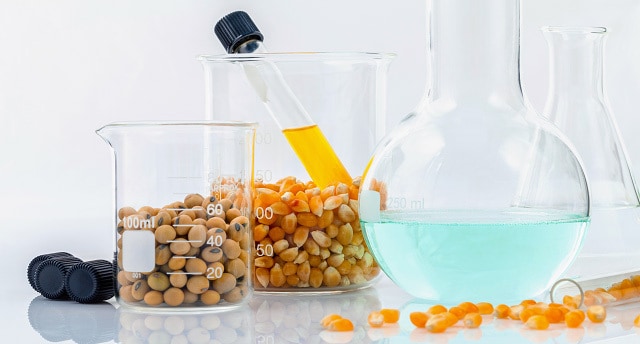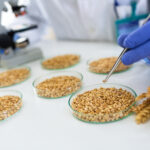In choosing a GMO testing lab, it’s important to consider the following points:
- If your product requires GMO testing, does the lab offer in-depth experience in GMO testing and an understanding of the GMO regulatory landscape (which can differ by country and market)? Customer service specialists at a more highly experienced lab will be able to offer guidance in the selection of a cost-effective GMO test plan to meet your objectives, which can help avoid costly missteps. They can also discuss any pertinent regulatory issues that may impact your business transaction and aid you in understanding your test results in light of your objectives. Work with a lab with at least 10 years of experience in GMO testing for greatest success.
- Does the lab offer the specific GMO tests you need? There is not one single cookie-cutter one-size-fits-all GMO test. Instead, it is necessary to select the right test or group of tests to meet your objectives. Many different types of GMOs can exist in the food chain—at the level of seed, ingredient, and finished product—and requirements vary as to which test(s) may be needed. Some labs may offer some GMO tests but not others. Customer service specialists at an experienced testing lab should be able to help you determine the specific GMO test(s) you need. Speak with the lab for help in selection of a specific GMO test plan to meet your requirements.
- Can the lab provide GMO testing for processed and multi-ingredient samples? Processed ingredients (e.g., corn starch, soy lecithin) and multi-ingredient products (e.g., cookies, corn chips) can be more challenging to test. The ability to accurately test these sample types depends upon a lab’s ability to obtain high quality and quantity DNA from the sample. A top lab will be able to optimally extract the required DNA. Ask the lab if they optimize the DNA extraction process for different sample types, to achieve maximum sensitivity and reliability.
- Will the lab deliver accurate test results? Why is accuracy so important? Inaccurate results can cause problems. For example, even if a manufacturer has tested its finished product and obtained satisfactory GMO test results, their customer may also test the product, and may reject the lot if test results do not meet contract specifications. Choosing a lab known to deliver accurate results is not only your best choice, but it ensures peace of mind and protects you from the risk of damage to your company’s reputation. To help you determine if your lab can deliver accurate results, review the points below.
- Has the lab earned the industry’s appropriate accreditation for GMO testing? ISO 17025 is the international standard for laboratory accreditation. It specifies the requirements for competence in testing and calibration for laboratories worldwide. As the industry’s undisputed measure of excellence, ISO 17025 helps provide legal defensibility, credibility, and respect. Ask the lab if it is accredited to ISO 17025 for GMO testing. The presence of the ISO 17025 accreditation seal on the analysis report confirms that the lab is accredited for the specific tests used.
- Is ISO 17025 accreditation enough when it comes to GMO testing? ISO 17025 accreditation should be viewed as a starting point when choosing a lab for GMO testing. But is it enough? Are all ISO labs more or less the same? The answer is an emphatic no. No two ISO labs are equivalent any more than are two accredited universities, physicians, or service organizations. The differences, in fact, can be vast. ISO 17025 accreditation requires continuous technical improvement. Thus, a laboratory that has been accredited for GMO testing for many years is more likely to be operating at a peak level of quality and technical commitment. Experience really matters. Ask the lab: For how many years have you been accredited for GMO testing? Ask specifically about accreditation for GMO testing. Accreditation for another kind of testing would not be relevant.
- Has the lab earned “flexible scope of accreditation” for GMO testing? When a laboratory has demonstrated a high level of technical competence over a period of years, it may be granted ISO 17025 flexible scope of accreditation. This means the lab can rapidly offer new accredited tests to the market, as long as it uses its same proven test methods. In contrast, a lab with a fixed scope of accreditation must undergo a formal, often lengthy accreditation process for each additional test. The more optimal flexible scope confirms competence and responsiveness. Ask if the lab has flexible scope of accreditation for GMO testing (the majority of labs do not). If it does, then you’re dealing with a top lab in the field.
Recap: What are the top concerns in choosing a GMO testing lab?
- Accurate test results. The signs of a technically competent GMO testing lab include ISO 17025 accreditation, optimized methods for processed and multi-ingredient samples, and many years’ experience in GMO testing.
- Customer service. Specialists at an experienced GMO testing lab can put that experience to work for you: listening to understand your testing needs, helping you select a cost-effective GMO test plan to meet your objectives, and reviewing test results in light of those objectives.






